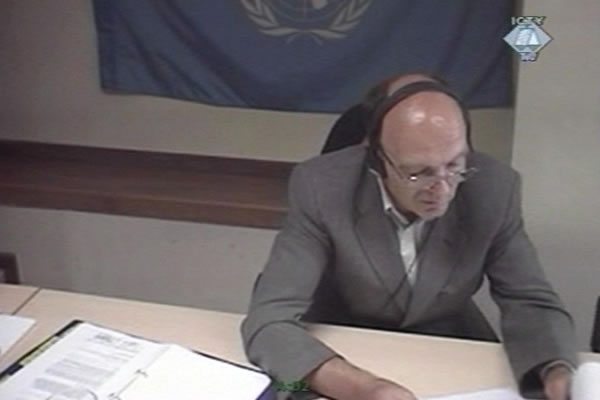Home
NEW INTERPRETATION OF THE WORD ‘PARCELS’
The defense of Vujadin Popovic contests the prosecution evidence that the chief of security in the VRS Drina Corps ‘supervised’ the executions of Bosniaks captured after the fall of Srebrenica in July 1995. According to the defense, the term ‘parcels’ Popovic used in an intercept wasn’t a reference to the prisoners to be executed but to the units that had come to help the Zvornik Brigade
 Ljubo Rakic, defence witness of Vujadin Popovic
Ljubo Rakic, defence witness of Vujadin Popovic On 16 July 1995, Vujadin Popovic, security chief in the VRS Drina Corps, was tasked with touring the front lines in the Zvornik Brigade area of responsibility. He was then to report to the Corps command. It was not his task to ‘supervise’ the executions of the Muslims captured after the fall of Srebrenica’, contrary to what is alleged in the indictment. This is what Ljubo Rakic said in his evidence via video link at the trial of the Bosnian Serb military and police officers accused of crimes in Srebrenica and Zepa.
In the summer of 1995, Rakic was chief of information technology in the VRS Drina Corps command. As the duty officer on 16 July 1995, he talked to Popovic on the phone. Their conversation was intercepted by the BH Army intelligence and its transcript was admitted into evidence as a prosecution exhibit during its case.
Popovic’s defense counsel showed the witness this document in an attempt to challenge the prosecution’s interpretation of the intercepted conversation. The prosecution took the ‘parcels’ Popovic tells his command as a reference to Bosniaks captured following the fall of Srebrenica. They were held in various locations in the Zvornik area and were later taken to mass execution sites. According to the prosecution, Popovic was referring to those locations when he said in the intercepted conversation, ‘there were terrible problems up there’.
Rakic offered a different interpretation of Popovic’s words. Elements of units sent to the Zvornik Brigade to help them fight the BH Army troops withdrawing in the direction of Tuzla were called ‘parcels’, the witness contends. According to the witness, ‘terrible problems’ were skirmishes with the BH Army members taking place ‘up there – in the Baljakovica area’ in which the Zvornik Brigade sustained substantial losses.
As it was expected, in his cross-examination the prosecutor focused on the interpretation of Popovic’s words and on the witness’s claims that on 16 July 1995 he hadn’t been aware of the fact that men had been separated from women and children. The witness also claims he was not aware that there were captives from a column that had been retreating towards Tuzla. He didn’t know they were later captured and executed. Rakic heard about that ‘much later from the media’. When the prosecutor asked him if he believed today those crimes had in fact happened, the witness replied that ‘something might have happened’ but he didn’t have reliable ‘information about that’ and wasn’t sure about the information published about that.
When he took over his watch on 16 July 1995, Rakic said, he was told about all the developments from the previous day. He didn’t know that the security chief of the Main Staff, Ljubisa Beara, had called general Krstic, the Drina Corps commander, on 15 July 1995 to ask for his help in ‘distributing’ ‘the 3,500 parcels’ he was left with. The prosecutor insisted that Rakic should know about it as the duty officer, but Rakic said today he had never heard of that before. The judges warned the witness he had the right not to answer any questions he thought might incriminate him.
Until the end of his cross-examination, Rakic mostly said he couldn’t remember the information the prosecutor put to him, including an intercepted conversation indicating that on 17 July 1995 Rakic was not in Vlasenica but in the Zvornik Brigade command, where, as the indictment alleges, more than a thousand Bosniaks captured after the fall of Srebrenica were executed the previous day.
Linked Reports
- Case : Popovic et al. - "Srebrenica"
- 2008-06-04 KARADZIC AND KRSTIC BEHIND THE ATTACK ON SREBRENICA
- 2008-06-03 STRATEGIC GOALS WERE IMPLEMENTED ‘BY CHANCE’
- 2008-06-02 DEFENSE: NO GENOCIDE IN SREBRENICA
- 2008-06-18 WITNESS WITH POOR MEMORY
- 2008-06-26 HOW DID SREBRENICA VICTIMS DIE?
- 2008-07-04 COMMAND OR ‘PROFESSIONAL CONTROL’
